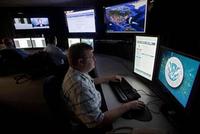-
FBI, NSA want surveillance measures to remain in reauthorized Patriot Act
On 1 June, Section 215 of the U.S.A Patriot Act, which permits law enforcement and intelligence agencies to collect certain customers’ records from U.S. businesses including communications and credit card firms, is set to expire. Congress has been debating whether to reauthorize the section of the act or pass measures that will curb the level of surveillance it currently grants. In recent days, representatives from the NSA and the FBI have been meeting with legislators to inform them of the importance of Section 215, still both chambers of Congress seem to be uncertain on how to move forward.
-
-
Police use of Stingray technology raises privacy advocates’ ire
Detective Emmanuel Cabreja, a member of the Baltimore Police Department’s Advanced Technical Team, recently testified that the unit owns and operates a Hailstorm cell site simulator, the latest version of the Stingray — a device which mimics a cellphone tower to force phones within its range to connect. For years, law enforcement agencies have used Stingrays to find wanted suspects, but until recently, the technology was largely unknown to the public, partly because law enforcement officers were banned from revealing such information to judges and defense attorneys.
-
-
Privacy concerns potentially an obstacle to 1 June Patriot Act reauthorization
With the USA Patriot Act set to expire on 1 June, lawmakers are debating whether the bill, which allows the National Security Agency (NSA) to collect bulk metadata of U.S. phone records, should be extended. The act was last renewed in 2011, before former NSA contractor Edward Snowden revealed details of the U.S. intelligence agency’s surveillance activities. The debate around the reauthorization of the Patriot Act focuses on Section 215 of the law, used by the NSA to mass collect phone records in an effort to locate terrorists who might be calling supporters in the United States.
-
-
The many problems with the DEA's bulk phone records collection program
Think mass surveillance is just the wheelhouse of agencies like the NSA? Think again. One of the biggest concerns to come from the revelations about the NSA’s bulk collection of the phone records of millions of innocent Americans was that law enforcement agencies might be doing the same thing. It turns out this concern was valid, as last week the government let slip for the first time that the Drug Enforcement Agency (DEA) had also been collecting the phone records of Americans in bulk since the 1990s.
-
-
Former head of MI6 calls for new surveillance pact between governments and ISPs
The former head of British intelligence agency MI6, Sir John Sawers, has called for a new surveillance pact between Internet companies and U.S. and U.K. security services. Both groups could work together as they had in the past to prevent a repeat of terror events such as the recent Paris attacks, he said. American and British law enforcement and intelligence agencies are urging major Internet companies to provide backdoors or access to encrypted e-mails and other forms of Web communications. “I think one benefit of the last eighteen months’ debate [since Snowden’s leaks were made public] is that people now understand that is simply not possible [to keep the public secure without surveillance] and there has to be some form of ability to cover communications that are made through modern technology,” Sawers said.
-
-
No technological replacement exists for bulk data collection: Report
No software-based technique can fully replace the bulk collection of signals intelligence, but methods can be developed more effectively to conduct targeted collection and to control the usage of collected data, says a new report from the National Research Council. Automated systems for isolating collected data, restricting queries that can be made against those data, and auditing usage of the data can help to enforce privacy protections and allay some civil liberty concerns, the unclassified report says.
-
-
Keeping citizens safe while respecting their right to privacy
Surveillance is an increasingly common – and sometimes controversial – activity, designed fundamentally to protect public and property. The rapid increase in information gathered by surveillance cameras however has led to spiraling costs in terms of storage filtering and data checking, and has also led to concerns that innocent citizens are routinely being tracked. Using innovative new technology, EU-funded researchers have reconciled the need for robust surveillance with the right to privacy.
-
-
Judges question claims that NSA metadata collection poses threat to ordinary citizens
A panel of three judges on the U.S. Court of Appeals for the District of Columbia challenged arguments made earlier this week by Larry Klayman, a conservative lawyer arguing on his own behalf, and Cindy Cohn, an attorney representing the Electronic Frontier Foundation (EFF) and the American Civil Liberties Union (ACLU), that the National Security Agency’s (NSA) mass-surveillance program is a breach of the Fourth Amendment, which protects against unreasonable searches.The case, Klayman v. Obama, is one of three currently at the appeals-court level regarding the NSA surveillance program.In the D.C. Circuit Court of Appeals, Judges Stephen Williams and David Sentelle voiced skepticism about claims that collecting metadata posed a threat to ordinary citizens.
-
-
Law enforcement: Apple iOS 8 software would hinder efforts to keep public safety

With its new iOS 8 operating software, Apple is making it more difficult for law enforcement to engage in surveillance of users of iOS8 smartphones. Apple has announced that photos, e-mail, contacts, and other personal information will now be encrypted, using the user’s very own passwords — meaning that Apple will no longer be able to respond to government warrants for the extraction of data.
-
-
Leaked documents reveal law enforcement hacking methods

Through the sourcing of a leaked documents cache from the Italian firm Hacking Team, members of the University of Toronto’s Citizen Lab have revealed the methods of law-enforcement hackers. While much of Snowden’s revelations concerned broad international surveillance, documents from Hacking Team reveal more specific methods such as the actual techniques for tapping phones and computers to operate as eavesdropping devices.
-
-
Judge rules use of NSA surveillance-based information in terrorist case is legal
Lawyers for Mohamed Mohamud, a U.S. citizen who lived in Oregon, have been denied a motion to dismiss his terrorism conviction, with the court affirming the legality of the U.S. government’s bulk phone and e-mail data collection of foreign nationals living overseas. Mohamud’s defense team claimed the surveillance violated his constitutional rights, and that federal prosecutors did not make available to the defense evidence obtained via the surveillance. U.S. District Judge Garr King upheld Mohamud’s conviction, saying that suppressing the evidence collected through NSA surveillance “and a new trial would put defendant in the same position he would have been in if the government notified him of the (surveillance) at the start of the case.”
-
-
Arizona lawmaker pushes measure to limit NSA operations in the state
Arizona State Senator Kelli Ward, a tea party Republican representing the Lake Havasu area, is pushing a bill in the State Senate which would impose limits on the ability of the NSA to operate in Arizona. In December Ward became the first legislator in the nation to declare she would introduce legislation to limit NSA activities in the state, and so far legislators in twelve other states have introduced similar bills. Arizona SB 1156 would. Among other things, prohibit local and state law enforcement officials from cooperating with the NSA and would prevent state or local prosecutors from using NSA-collected information which had not been obtained with a warrant. The bill would also withhold funds from state universities and colleges supporting the NSA with research or recruitment. Legal scholars say the courts would in all likelihood strike down Ward’s measure because Arizona, in essence, is trying to regulate the federal government.
-
-
A first: Constitutionality of NSA warrantless surveillance challenged by terrorism suspect
Jamshid Muhtorov, a refugee from Uzbekistan now facing terrorism charges in Colorado, is the first criminal defendant who, as part of his lawyers’ defense strategy, is challenging the constitutionality of the NSA’s warrantless surveillance program. Muhtorov filed a motion Wednesday in federal court in Denver to suppress any evidence obtained through the agency’s surveillance program on grounds that it was unlawful. In July 2013 the Justice Department reversed an earlier policy, and now informs defendants whether the case against them, in whole or in part, is based on information obtained through warrantless surveillance. To date, six months after the review process at Justice was launched, Muhtorov and Mohamed Mohamud, a Portland, Oregon teenager who had been convicted after an FBI sting operation of attempting to detonate a bomb at a Christmas tree lighting ceremony, are the only defendants to receive such a disclosure.
-
-
A first: Judge in terrorism case rules defense may examine government secret FISA application
U.S. District Judge Sharon Johnson Coleman ruled yesterday (Wednesday) that the U.S. government cannot keep secret its request to conduct clandestine surveillance of an accused would-be terrorist. The ruling gives defense attorneys an unprecedented access to a request made to the Foreign Intelligence Surveillance Act (FISA) court for permission to spy on an American citizen. Judge Coleman said her ruling is the first time a defendant’s lawyers will be given access to an application prosecutors submitted to the FISA court. Security experts warned that opening FISA applications to review in a criminal case may set a dangerous precedent.
-
-
Minnesota wants to limit law-enforcement use of wireless tracking devices
The Minnesota Department of Public Safety’s acquisition of Kingfish and Stingray II wireless surveillance devices has come under scrutiny as the department’s Bureau of Criminal Apprehension(BCA) has used the devices in investigations. Some legislators are considering placing limits on law enforcement’s use of the data captured by the devices because of concerns over who has access to the data and how long it is being kept.
-
- All
- Regional
- Water
- Biometrics
- Borders/Immig
- Business
- Cybersecurity
- Detection
- Disasters
- Government
- Infrastructure
- International
- Public health
- Public Safety
- Communication interoperabillity
- Emergency services
- Emergency medical services
- Fire
- First response
- IEDs
- Law Enforcement
- Law Enforcement Technology
- Military technology
- Nonlethal weapons
- Nuclear weapons
- Personal protection equipment
- Police
- Notification /alert systems
- Situational awareness
- Weapons systems
- Sci-Tech
- Sector Reports
- Surveillance
- Transportation
Advertising & Marketing: advertise@newswirepubs.com
Editorial: editor@newswirepubs.com
General: info@newswirepubs.com
2010-2011 © News Wire Publications, LLC News Wire Publications, LLC
220 Old Country Road | Suite 200 | Mineola | New York | 11501
Permissions and Policies
Editorial: editor@newswirepubs.com
General: info@newswirepubs.com
2010-2011 © News Wire Publications, LLC News Wire Publications, LLC
220 Old Country Road | Suite 200 | Mineola | New York | 11501
Permissions and Policies
